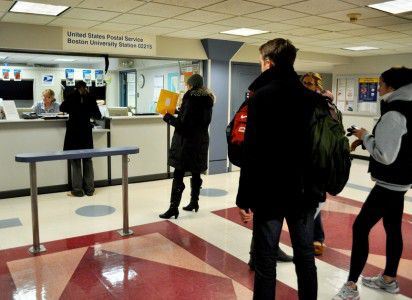
On Feb. 11, 2011, the United States Post Office Unit located in the basement of the George Sherman Union will close its doors, Postal Service officials said.
In 2009, the Postal Service conducted a discontinuance study that revealed the BU branch should be closed to minimize financial losses, said Dennis Tarmey, a spokesman for the Post Office in the Greater Boston District.
“The Postal Service is being faced with a severe economic forecast as our mail volumes have declined drastically, as has our revenue,” Tarmey said.
Due to rising costs, declining mail volumes and the proximity of the Kenmore Station Post Office, the BU branch faced financial issues.
According to a Post Office transaction report, Tarmey said, there were 4,556 total transactions at the BU Post Office in November of 2010, which amounted to about 151 transactions every day.
For that same period, there were about 12,356 transactions at the Kenmore location, or the equivalent of 411 per day.
Because the branch is located on campus, the monthly sales numbers vary greatly and there is a definite drop during the summer and winter breaks, Tarmey said.
Students who said they use the post office at the GSU frequently said they were shocked by its closing.
“It’s kind of annoying, actually,” said College of Communication junior Elizabeth Townsend. “This post office is really convenient because I come to the GSU just about every day. I use this post office to send packages, sometimes thank-you cards, birthday gifts and I get all my stamps here.”
Sixty-four people are members of a Facebook group called “Save the BU Post Office,” which was formed in August of 2009 by BU graduate student Brian Sirman.
“[The post office’s] closure will mean even more overwhelming lines at the congested Kenmore and Brookline post offices, not to mention a longer trek for many of us to buy stamps, send packages and conduct other postal business,” the group info states.
The group urged members to sign an online petition and write representatives of Congress letters asking them to keep the BU Post Office open.
However, the group’s efforts did not succeed.
“We do not enjoy closing a post office, any post office,” Tarmey said. “However, we have to take steps now to ensure our future viability. We have been taking a number of different steps in a multi-pronged approach to the economic situation that we find ourselves in.”
Some of these steps include halting construction of new facilities, selling unused and underutilized postal facilities, adjusting work hours to reflect customer use and negotiating an agreement with the Letter Carriers
Union to adjust letter carrier routes that reflect diminished mail volume, he said.
“By closing the BU Post we can save a number of costs associated with the operation,” Tarmey said. “Costs are associated with leasing, utilities and transporting mail to and from this facility.”
BU Vice President of Administrative Services Peter Fiedler said although the university administration was invited to submit a partnership proposal to the Postal Service offering ways it could assist it in reducing costs and raising revenue, BU was not directly involved in the decision to close the post office.
The Postal Service simply rents the space from the university, Fiedler added.
Dean of Students Kenneth Elmore said the post office’s close is “sad news.”
“It was a service the BU community used and the folks who worked down there are the people in the community who enjoyed interacting with everyone – a bit like family,” he said.
The Kenmore Station, located on 11 Deerfield St., is about a half of a mile away from the GSU in another building owned by the university.
The university has not determined how it would utilize the space in the GSU after the Post Office closes, Fiedler said.
This is an account occasionally used by the Daily Free Press editors to post archived posts from previous iterations of the site or otherwise for special circumstance publications. See authorship info on the byline at the top of the page.



